by Brian de Lore
Published 15th September 2022.
TAB NZ runs advertising warning customers against the perils of addictive gambling and betting more than one can afford. It paints itself as an organisation that acts responsibly and cares about its customers, and all of us who place bets would like to think that’s true.
But, I’m afraid it’s far from the truth.
You don’t have to dig far beneath the shiny cosmetic side of the TAB to discover pari-mutuel or tote betting has a Catch-22 side to it, known only by a few people. They include those employees running the TAB’s elite punters group and a small number of big punters getting privileges paid for by the average punter.
It’s a rob Peter to pay Paul scenario. If you’re an average punter betting on the tote, you’re Peter. If you’re getting a rebate because you bet big, you’re Paul. A large number of Peters get skimmed to subsidise the winnings of a small group of Pauls. It does not apply to fixed-odds betting, only the tote.
Big punters getting rebates
In an enlightening conversation this week with a former top Tabcorp man who knows the wagering business worldwide, I learned that at any one time, there exists somewhere between six and ten individuals or syndicates that bet massive amounts internationally. With the help of rebates, usually around eight to 10 percent, but as high as 18 percent in the USA, where the ‘take-out’ can be as high as 20%.
Every wagering company in the world competes for the business of the big punters by offering rebates, and TAB NZ is no exception. But it’s secret squirrel stuff because the small punter or the ‘Peters,’ as I have labelled them, are getting their pockets picked unawares.
I can’t see that this is anything but stealing more money from punters who, over a lifetime, will lose anyway.
One of the Pauls is a man named Zeljko Ranogajec, a native Tasmanian of Croatian parents, who almost sent the Tasmanian TAB broke a few years ago – the state government bailed it out. Zeljko, or Z as he is sometimes known, is reputed to be a multi-billionaire from betting over the past 30 years.
He is still betting but now lives as a tax exile in the Isle of Man after the ATO (Australian Tax Office) chased him for back taxes from his winnings.
Zeljko skimming average punter even when placing losing bets
Z has never done an interview, but when taken to court by the ATO a few years ago, his operation came into the open. He admitted to the magistrate he makes most of his money by placing losing bets, making his money almost exclusively from the rebates in exchange for massive turnover.
Here’s how Z operates. He is a mathematical genius who developed an algorithm that will yield him a profit or loss threshold of +5% to -5% on every race he bets, betting on multiple runners. With a sophisticated computer software system, his computer will calculate the exact amount to be placed on each runner in the dying seconds before the race closes.
With the push of a button, the computer places the bets, and if the algorithm achieves the worse result of minus 5%, Z still wins on the race because his rebate is 10%. Potentially, his best result is plus 15%.
Z is betting on hundreds of races every week around the world, including New Zealand. Here’s evidence of his handiwork at an Addington dog meeting on Tuesday of last week.
Scam exposed on dog race betting
Three screenshots as evidence are displayed at the bottom of the page, but here’s the commentary: With 36 seconds before closing, the odds-on favourite, Diamond Vaper, was paying $1.70 to win and $1.00 to place with $1,246 in the win pool and $519 in the place pool.
In the running with the tote closed, Diamond Vaper showed $1.60 to win and $3.50 (very strange) the place, with the pool unchanged at $1,246 the win and $519 the place.
But two minutes later, well after the race finished, the win pool had exploded to $6,009 and the place pool to a mammoth $16,058. Diamond Vaper jumped straight to the front and won by 5¼ lengths untroubled. Note the vast discrepancy between the runners’ fixed and tote place prices when you view the third screenshot – the winner paid $1.30 to win and $1.40 the place.
The pool had mysteriously increased by $20,302, an increase of 1,150% on the amount shown ‘in running.’
I examined only five dog races that day at Addington and took the screenshots just in case. It’s a reasonable indication it’s happening regularly, and those in the know assure me that Z is the punter, having the luxury of the algorithm and software to get the money on late.
With all the above considered, does item 76 in the Racing Industry Act of 2020 present any cause for concern? It says in (Clause 3 below) that a provision exists for the TAB to allow betting for up 20 seconds after the race starts – potentially a good helping hand in the dog race quoted above. The winner over 295 metres completed the journey in 17 seconds.
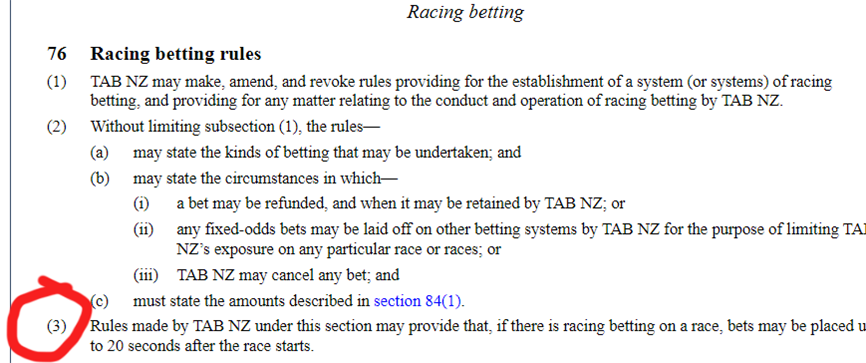
A dozen years ago, Z admitted to the magistrate in court that he bet approximately $1 billion annually. No wagering company in the world has banned him because they want the turnover, but he is known to bet regularly in New Zealand because TAB NZ does not restrict the dividend level on his bets, whereas Australia will not accept bets from him paying less than $1.20.
So what happens when a horse such as Winx lines up with an actual price of $0.60 for the place dividend, and the betting rules say it must return $1.00? He bets $100,000 and gets the rebate?
No one talks about rebates. You won’t find any reference to the word in an annual report, so what happens when there are not enough ‘Peters’ in the pool to skim and pay winning bets to the Pauls?
Could the cost be covered up in other places in the annual reports? Here’s a possibility – consider the discrepancy in the 2015 Annual Report for ‘turnover related expenses’ with the 2019 Annual Report where the year of 2014-15 is duplicated.
The problem is that one 2014-15 figure in the 2015 Report is $53 million, but in 2019 the same year mysteriously increases to $64.6 million, a difference of $11.6 million. Where did that increase come from? Does the phrase ‘turnover related expenses’ have a Z in it?
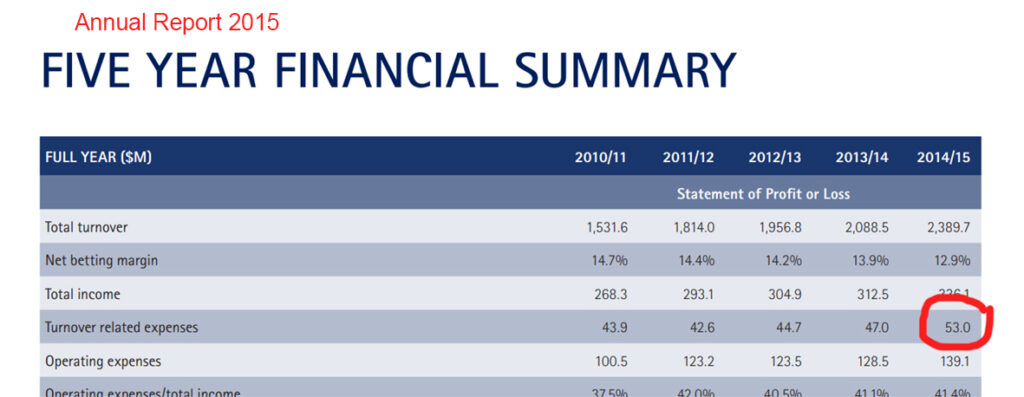
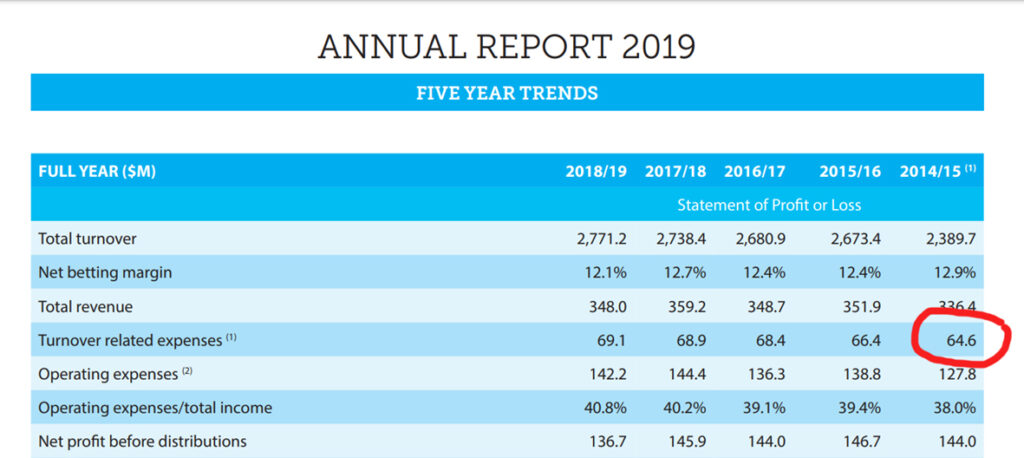
Indeed the auditors, Price Waterhouse Coopers, should have picked this up when they wrote their report. However, they say the directors are responsible for preparing the financial statement and ensuring they are free from material misstatement due to fraud or error.
The comingling of the trifecta pools with Tabcorp seemed to go sour about 2015 when the Aussie wagering company suspected Z got rebates from the NZ pool, with the latter having a higher percentage take-out – 25%. Either way, New Zealand trifecta punters get a raw deal with smaller pools and the weight of supporting Z.
Recent results posted by TAB NZ indicate all is not well. July profit came in at $8.7 million, $5.2 million below budget. Operating expenses for July amounted to $11.9 million and $1.7 million above budget. You’re in the sewerage when income falls and costs rise by that much.
TAB NZ profit fell by $23 million but costs rose – this past year
For the full year, profit fell by $23.5 million from the previous year to $154.8 million. Operating expenses rose to $119.0 million or $5.4 million above the previous year.
This result is a disaster. The low stakes we race for won’t be sustainable. It’s yet another nail in the coffin of NZ racing, and again highlights the poor decision not to adopt the Messara Review in its entirety.
Recommendation seven of the Messara Review would have markedly increased TAB profitability and halved the costs. But no, we had to keep doing the same old thing.
An ex-TAB long-term employee with 30 years of experience in the racing industry recently told me that key TAB employees are neither concerned about rising costs nor the addicted gamblers from whom they take bets. He said it’s all about ramping up the turnover, so they look good with costs hidden in other accounts – citing the bonus-bet scandal to hide $6 million.
And now we learn the DIA is undertaking a review into online gambling. What a joke that the Government thinks it can review and adjudicate on a business they know zero about.
This review is one of approximately 300 Government reviews currently underway in NZ. No wonder the civil servant population has increased by 50,000 in the past five years
No doubt they are looking into the possibility of geo-blocking the TAB as Australia has done. But there’s no possibility of it happening with TAB NZ in it’s current form with all of these skeletons that occupy the closet.
And it couldn’t possibly happen without partnering the whole business and offering punters a far superior and more honest product than it offers today. Z is not complaining, though. He seems happy with the current setup.
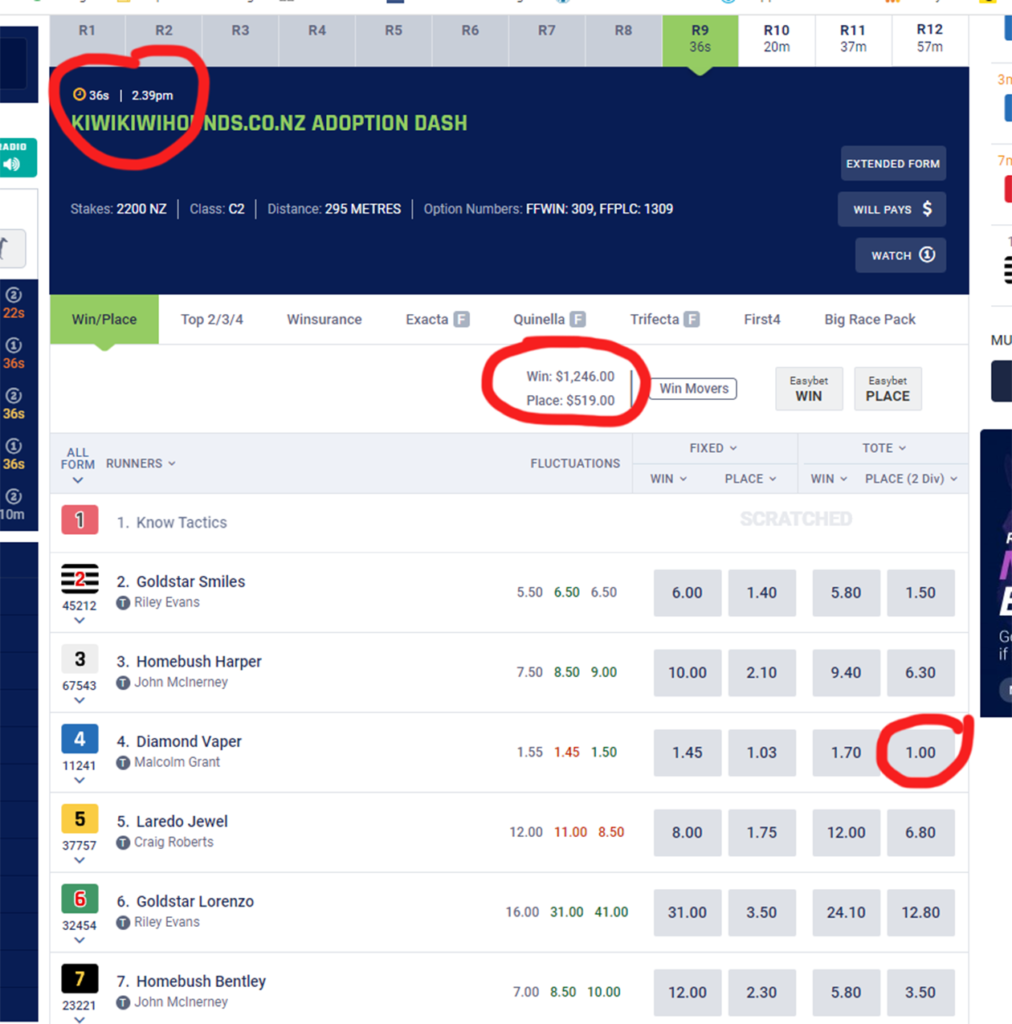
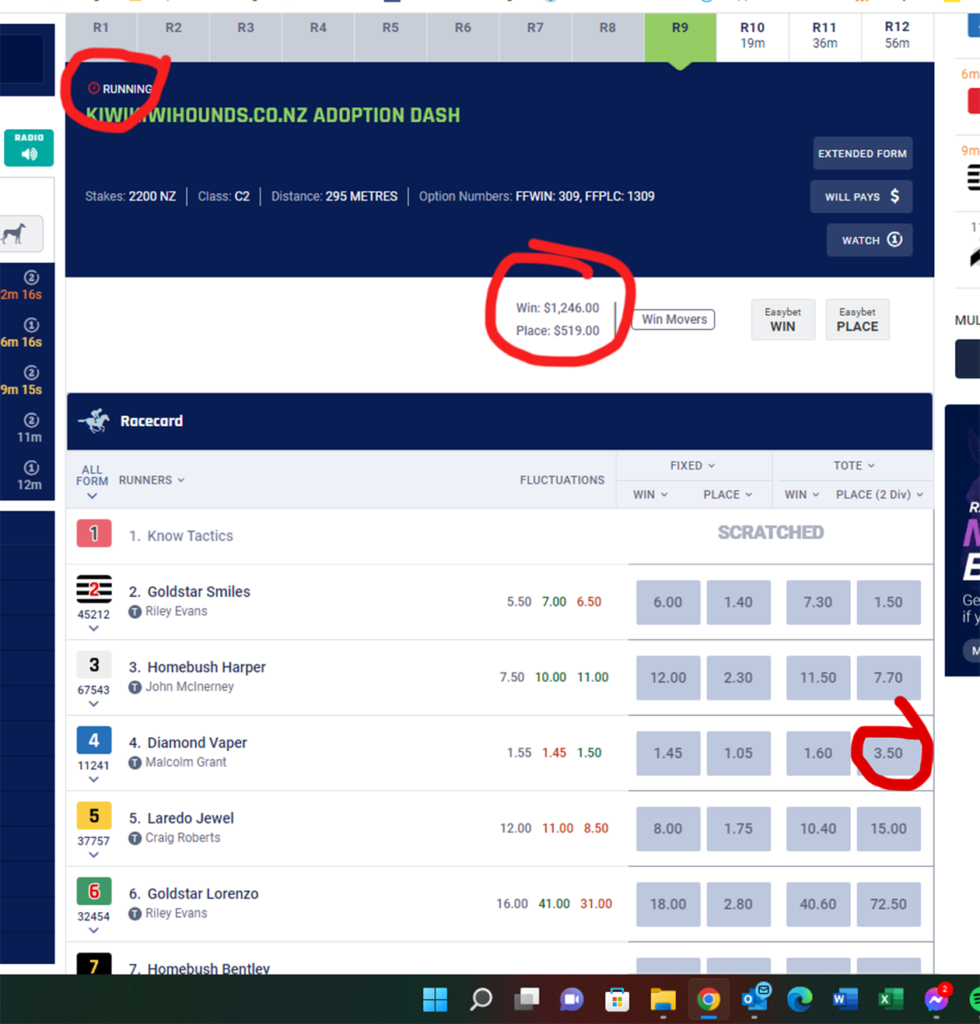
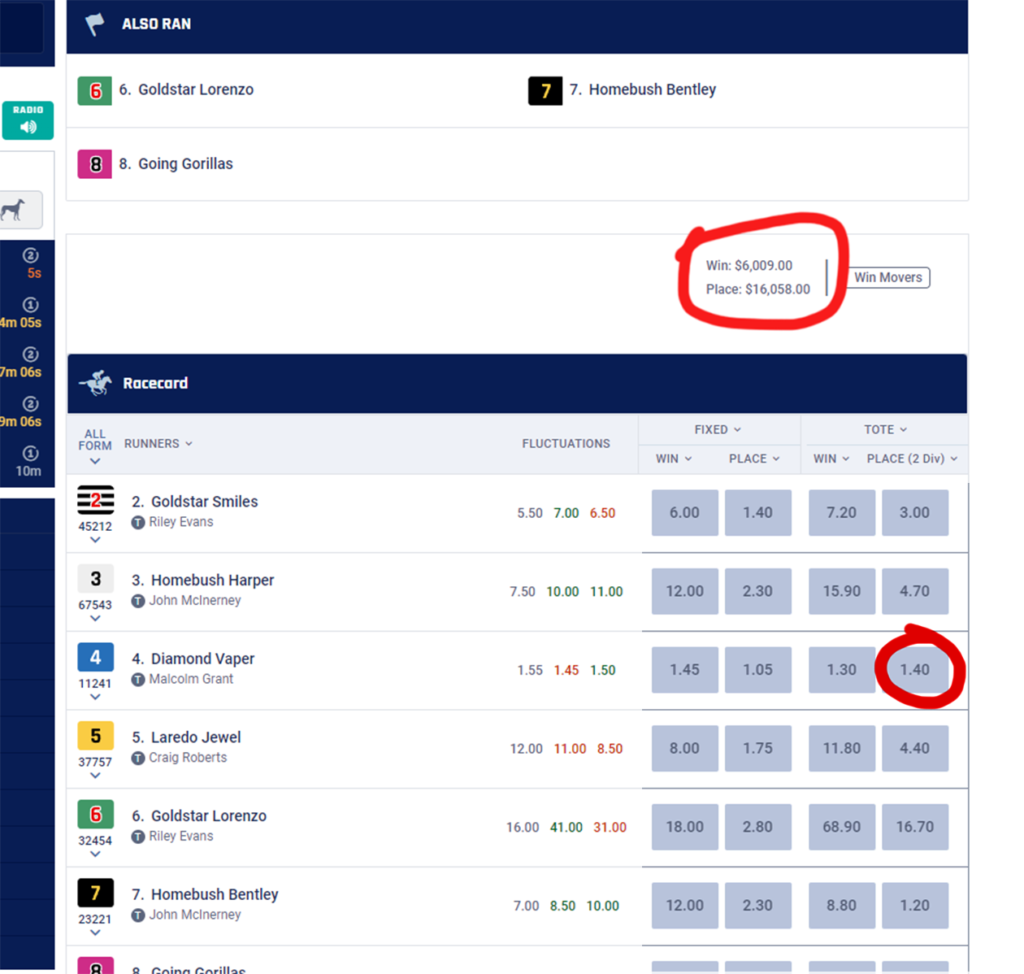
Click on the following link for a youtube more information on Zeljko Ranogajec:

